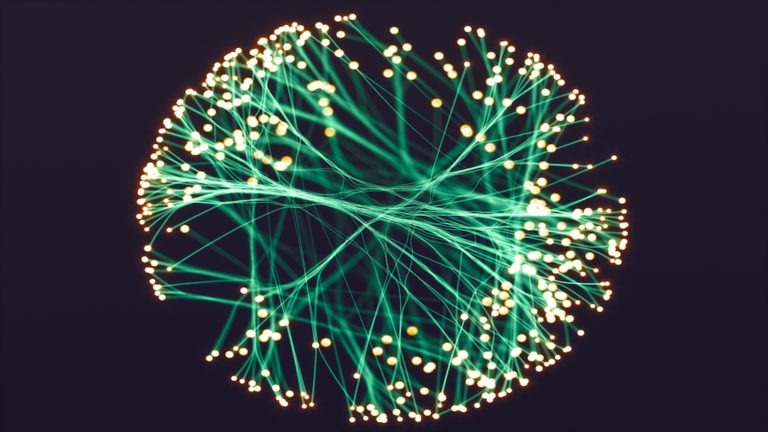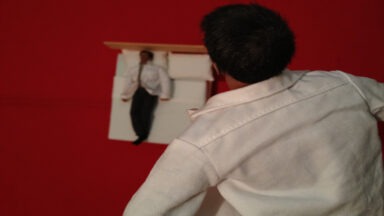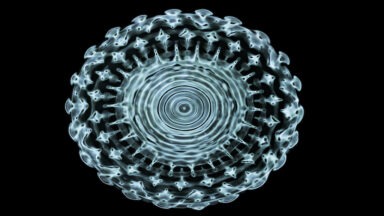How to Live in the Now to Rewire the Brain and the Body

Countless experts have weighed in on the mind-body issue, trying to explain how the mind affects the body and how it can be used as a tool to effect changes in health and happiness. And then Dr Joe Dispenza came along and raised the bar with his research that includes a melding of meditation, quantum physics, psychoneuroimmunology, and neuroscience.
Arising from Dispenza’s work is a science-based understanding of how the mind can be used as a tool to create changes in the body and reverse disease. In the second and third episodes of his eye-opening series “Rewired,” Dispenza delves deeply into the science of conscious change by recognizing habitual thinking patterns.
Dispenza speaks about the popular idea of “being present” from a scientific point of view, and how to use meditation to transcend your body and environment, as well as time to reach the “sweet spot of the generous present moment.”
The question naturally arises: How does finding this “now” help you? The answer is that in order to change the health of your body and focus on creating a new personality, you have to get past the analytical mind. This requires being “in the now,” which Dispenza refers to as the key to becoming “supernatural.”
Amping Up Your Meditation Practice
Meditation, Dispenza says, means “to become familiar with.” If we can become familiar with the fact that 95 percent of who we are by age 35, which includes reflexive emotional reactions that define our personalities, we will realize that we are running an unconscious/subconscious program. When, with the help of meditation, we become conscious of our unconscious thoughts and notice how we are feeling, our states of mind and body become known to us.
This, in turn, leads to a change in the hardwired attitudes and thoughts that usually occur without conscious awareness of them. The awareness makes the change.
Typical thoughts that interfere with good health and happiness, says Dispenza, include ones such as “I’ll never change,” “It’s too hard,” “I’ll never find love,” or “My life isn’t very good.” When these thoughts come to the surface during meditation practice, the moment you realize you can’t control these thoughts, says Dispenza, the tendency is to give up — and you buy into the belief that you’re not very good at meditation.
But victory comes when you realize that you can simply not put your attention on these types of thoughts. There is no need to react to them, just don’t give them any energy. This is the beginning of knowing yourself. There is a realization, says Dispenza, that you are not the body; “you are the mind.”
Liberating Your Energy
“Every time you work on overcoming some aspect of your old personality there is a liberation of energy,” says Dispenza. When he and his research team studied students who kept returning the body back into the present moment, because the body is a servant of the mind, they discovered that sooner or later the body acquiesces.
And when it does, notes Dispenza, “there’s a liberation of energy.” This energy then becomes available to heal and create a new future. The process of change is breaking the habit of the old self and reinventing the new self by pruning old connections and sprouting new ones.
Liberated energy can go toward installing new thoughts, and this is the key to change in the body.
The Analytical Mind Obsesses About the Past and Future
Ninety-five percent of who we are by age 35 is our subconscious mind (attitudes, beliefs, perceptions, and habits), says Dispenza. Children become programmed at a very early age, having developed their analytical minds between ages 6 and 9. Once this analytical mind is formed, says Dispenza, a person divides the conscious mind from the subconscious mind. Although the analytical mind is important for learning and navigating our world, it also becomes constantly involved in thinking about the past and future.
Edward Enever, a health coach who works with cancer patients, explains that “the left brain is all about the past, and it’s all about the future. It digs through the database of memories and experiences to try to relate the present moment to something, then it projects into the future the possibilities based on these. So under stress or a dominant thinking mind, our consciousness projects out into the future and the past away from the present moment.
Meditation is the practice of bringing yourself back into present moment awareness and not living in the future and/or the past. This is where mindfulness comes in. When we are present, we are mindful. When our consciousness is projected out, we are unmindful and that’s where we can make mistakes or poor choices.”
Thus, according to Joe Dispenza, to realize real change is to make your mind work for you by becoming aware of the process of automatic programming, and to move your thoughts into the present moment.
Stress Causes Undesirable Changes
In the fourth episode of “Rewired,” Dispenza shows that there are three types of stress: physical, chemical, and emotional. Combined with anxiety, depression, and other states that perpetually make people the effect of automatic, habitual unconscious thinking, these take their toll on the physical body and mental health.
The chemicals of stress cause health issues by knocking the brain and body out of balance. And “the hormones of stress push the genetic buttons and create disease.” So when people are living in chronic stress, and the field around their body is shrinking, they feel disconnected from everyone and everything in life, they try to force and control outcomes.
The solution, Dispenza says, is to live “in creation,” which is “the exact opposite of living in survival.” Ultimately, it is a matter of moving the thoughts into the present, away from the stress of the past and anxiety of the future and to do this takes rewiring the mind.
432 Hz Frequency: What It Is And How To Connect With Its Power

The 432 Hz frequency is a musical tuning used since ancient times by various cultures due to its harmonizing effect on the body and mind. Its sound resonates with mathematical patterns found in nature and is considered a tool for well-being and the expansion of consciousness. In this article, we explore what the 432 Hz frequency is, its uses, and how to incorporate it into daily life.
Table of Contents
- What Is The 432 Hz Frequency?
- What Is The 432 Hz Frequency Used For?
- Differences Between 432 Hz And 440 Hz Frequencies
- How To Use The 432 Hz Frequency In Your Daily Life
What Is The 432 Hz Frequency?
The 432 Hz frequency is a musical tuning that maintains a mathematical relationship with nature and the universe. It is in tune with the golden ratio, present in the structure of the human body and in patterns such as the Fibonacci sequence. Its sound is more harmonious and balanced compared to the standard 440 Hz tuning.
Different civilizations have used this frequency in their spiritual and ceremonial practices. In ancient Greece, Pythagorean music was based on mathematically perfect scales, while in Egypt and India specific sounds were used to induce deep meditative states. Many ancient instruments were designed to vibrate at 432 Hz, suggesting an intuitive understanding of its impact on consciousness.
In the series Sound of Creation, available on Gaia, experts like Gregg Braden and Dr. Robert Gilbert explore the relationship between sound, sacred geometry, and the vibration of the universe. Through scientific findings and ancestral knowledge, this series reveals how certain frequencies can influence perception and human well-being.
What Is The 432 Hz Frequency Used For?
The 432 Hz frequency has multiple applications for harmonizing the body and mind. Its balanced vibration influences emotional states, concentration, and energetic health. Below are some of its main functions:
- Deep relaxation: It lowers heart rate and brain activity, reducing stress and anxiety. Its sound has a calming effect that facilitates meditation.
- Enhanced concentration: It increases mental clarity and promotes focus. Listening to music in this frequency during study or work improves information retention.
- Energy balance: It aligns the flow of energy in the body and harmonizes the chakras. Its vibration restores physical and emotional well-being.
- Greater connection with nature: It resonates with the Earth’s frequency, strengthening the sense of unity with the environment. Listening to it outdoors enhances its beneficial effects.
- Induction to restorative sleep: It promotes progressive relaxation that facilitates deep rest. Using it before bedtime helps improve sleep quality and reduce anxiety before sleeping.
- Emotional healing: It releases accumulated tension and balances the nervous system. Its vibration works on the subconscious, promoting well-being and emotional balance.
- Creativity stimulation: It activates areas of the brain related to inspiration and imagination. It is ideal for boosting creativity in artistic and expressive disciplines.
Differences Between 432 Hz And 440 Hz Frequencies
The 432 Hz and 440 Hz frequencies are both used to tune musical instruments, but generate different effects in those who listen to them. Today, most music is tuned to 440 Hz, a standard officially adopted in the 20th century. However, 432 Hz has been used in various traditions for its more harmonic sound and its ability to induce relaxation.
Many people perceive music tuned to 432 Hz as softer and more balanced, whereas 440 Hz may feel more tense and stimulating. For this reason, 432 Hz is preferred in practices involving meditation, healing, and wellness. While both frequencies can trigger emotional and physical responses, 432 Hz has become a popular alternative for those seeking a more harmonious and profound sound experience.
How To Use The 432 Hz Frequency In Your Daily Life
Incorporating the 432 Hz frequency into your daily routine is a simple way to promote well-being and emotional balance. You can listen to music tuned to 432 Hz during meditation, upon waking, while working, or before sleeping. It’s also helpful in yoga sessions, massages, or any relaxation practice, as its vibration enhances focus and energetic harmony.
-
432 Hz Music For Meditation And Mental Balance
Meditating with 432 Hz music enhances relaxation and facilitates connection with the present moment. Its vibration induces a state of mental calm, reducing internal noise and allowing for a deeper meditative experience. Many people use it to relieve anxiety, improve focus, and enhance introspection.
An example of this frequency can be found in the series Fractal Universe: Meditations for Conscious Elevation, available on Gaia, where sound patterns and geometry are explored to facilitate deep meditative states. The first episode uses a frequency based on the Schumann resonance, related to the Earth’s natural vibration, allowing the mind to synchronize with a state of balance and expansion.
-
Using The 432 Hz Frequency For Energy Healing
The 432 Hz frequency is used in sound therapies to balance the body’s energy and release emotional blockages. It’s believed that its vibration harmonizes the chakras and improves the flow of vital energy, making it effective in practices like Reiki, sound bowl therapy, and vibrational healing sessions.
Listening to this frequency while practicing breathing or visualization exercises can enhance its effects. Its sound generates a sensation of well-being and stability, helping to restore emotional and physical balance. For this reason, many people incorporate it into their healing and self-discovery journey.
-
How To Listen To 432 Hz Music For Better Sleep
Music in 432 Hz is an effective tool to improve sleep quality and reduce anxiety before sleeping. Its soft, enveloping sound slows down mental activity, helping the body enter a state of deep relaxation. Listening to it for a few minutes before bed can ease the transition to sleep and reduce insomnia.
To enhance its effects, it’s advisable to create a quiet and distraction-free environment. You can combine the music with slow breathing exercises or nature sounds tuned to the same frequency. This practice calms the nervous system and promotes more restorative rest.




































